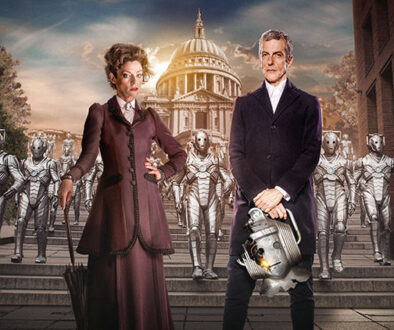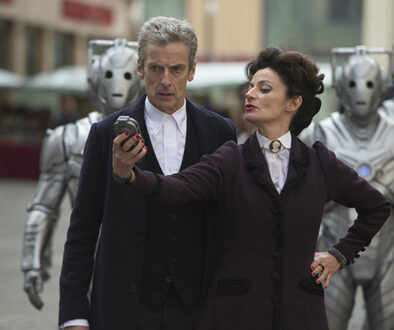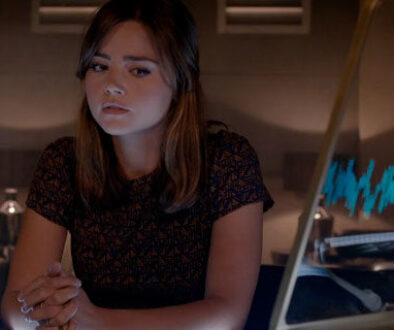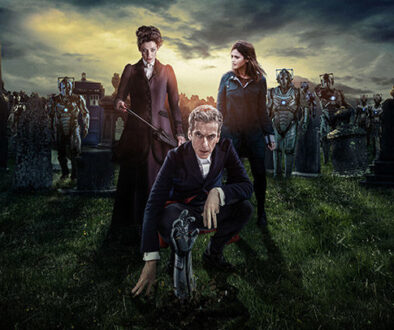Death in Heaven Review (Part 1)
Clint Hassell gives his verdict on the final episode of Series 8.

Series 8, with its emphasis on character arcs over plot-driven narrative, brings a new richness to Doctor Who, easily rivalling any series of the revived era. Even seriously flawed episodes have something grand to offer in the way of rich symbolism, character development, or thematic exploration, making the entirety of the series important in the build up to the final hour of the series finale. Unfortunately, despite both parts being written by showrunner Steven Moffat, “Death in Heaven” fails to capitalize on the incredible start provided by “Dark Water,” and falls far short of the high standard set by the rest of the series.
The biggest problem with “Death in Heaven” is the poor portrayal of the Cybermen. Created in the 1960s as a response to the emergence of surgeries that replaced diseased organs with artificial prosthetics, the Cybermen have always represented mankind’s struggle to identify the boundary between “man” and “machine,” and the fear that such “spare part” surgeries might inadvertently cross that line. “Death in Heaven” completely ignores this essential facet of the Cybermen mythos, instead depicting the cyber-conversion of dead bodies. Reanimated cadavers are not Cybermen, they’re zombies.
 Unfortunately, these new Cybermen don’t even make good zombies. Part of the sadistic thrill of a zombie story is seeing the protagonists face their recently deceased family and friends, who have now returned as threats. How can you kill a monster that still looks like Grandma? Only Clara encounters a reanimated loved one, and Danny never becomes dangerous, despite having his emotional inhibitor chip enabled. The Cybermen in “Death in Heaven” do little more than lumber around like walking dead, as they await having their minds downloaded from the Nethersphere. “They’re not attacking,” states Colonel Ahmed, “They’re just wandering about.” The entirety of the Cybermen invasion is relegated to clips from news broadcasts, which fail to capture a sense of peril. Not one person is killed on screen by a Cyberman, with only the aforementioned Colonel Ahmed being pulled through a window, ostensibly to his doom. The Cybermen in the morgue don’t even kill the attending coroner!
Unfortunately, these new Cybermen don’t even make good zombies. Part of the sadistic thrill of a zombie story is seeing the protagonists face their recently deceased family and friends, who have now returned as threats. How can you kill a monster that still looks like Grandma? Only Clara encounters a reanimated loved one, and Danny never becomes dangerous, despite having his emotional inhibitor chip enabled. The Cybermen in “Death in Heaven” do little more than lumber around like walking dead, as they await having their minds downloaded from the Nethersphere. “They’re not attacking,” states Colonel Ahmed, “They’re just wandering about.” The entirety of the Cybermen invasion is relegated to clips from news broadcasts, which fail to capture a sense of peril. Not one person is killed on screen by a Cyberman, with only the aforementioned Colonel Ahmed being pulled through a window, ostensibly to his doom. The Cybermen in the morgue don’t even kill the attending coroner!
Though showrunner Steven Moffat has stated, “I really wanted to do a Cyberman story . . . I was quite surprised that . . . I had never used them in any of my own scripts, except as supporting characters,” it seems he uses the iconic Cybermen to bolster the layperson’s interest in a finale that really features the Master, a character who is not as iconic to viewers familiar only with the modern era of Doctor Who, and who is now played by a new actress with no marquis value to a casual audience that may not have seen the entirety of Series 8. However, because the Cybermen are reduced to mindless drones by the episode’s plot, their menace is diminished, and Missy and her plan seem fairly ineffectual.
 Since “Death in Heaven” does not portray the carnage of the Cybermen invasion, the Master must kill Osgood, a beloved supporting cast member, to establish her threat level. It’s a scriptwriting shortcut, and a cheap one at that. The trick offers diminishing returns, when Missy also causes Kate Stewart to get sucked out of the cargo bay. Of course, Kate is too important a character to lose – she’s obviously not dead. Thus, rather than focusing on the third act’s graveyard scenes with Clara, Danny, and the Doctor, the audience is distracted, wondering about Kate’s whereabouts and condition.
Since “Death in Heaven” does not portray the carnage of the Cybermen invasion, the Master must kill Osgood, a beloved supporting cast member, to establish her threat level. It’s a scriptwriting shortcut, and a cheap one at that. The trick offers diminishing returns, when Missy also causes Kate Stewart to get sucked out of the cargo bay. Of course, Kate is too important a character to lose – she’s obviously not dead. Thus, rather than focusing on the third act’s graveyard scenes with Clara, Danny, and the Doctor, the audience is distracted, wondering about Kate’s whereabouts and condition.
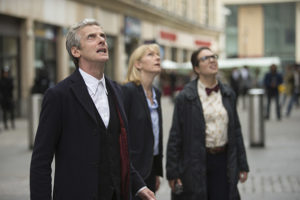 In fact, despite the logic that U.N.I.T. would be Earth’s primary response to an invading army of Cybermen, “Death in Heaven” actually provides very little for the military task force to do. Sure, seeing disguised U.N.I.T. soldiers as selfie-loving tourists is fun, as is Osgood’s newfound love for Eleven (“Bowties are cool.”), having now met the Time Lord, instead of merely reading about him in dusty U.N.I.T. files. Also, it is nice to further flesh out Kate, finding out that she’s a “divorcée” and “a mother of two.” She’s as commanding as ever – fantastically capable, yet still human and relatable. Her using a damaged, relic Cyberman head as an intimidation tactic is a fist-pumping moment. Beyond this brief scene, however, U.N.I.T. contributes little to the story beyond a setting change from St. Paul’s Cathedral to Boat One, and exposition that explains Missy’s plan. The same could be said for the terrifically underused Seb as, once Danny is cyber-converted, there’s nothing for the Nethersphere’s A.I. to do.
In fact, despite the logic that U.N.I.T. would be Earth’s primary response to an invading army of Cybermen, “Death in Heaven” actually provides very little for the military task force to do. Sure, seeing disguised U.N.I.T. soldiers as selfie-loving tourists is fun, as is Osgood’s newfound love for Eleven (“Bowties are cool.”), having now met the Time Lord, instead of merely reading about him in dusty U.N.I.T. files. Also, it is nice to further flesh out Kate, finding out that she’s a “divorcée” and “a mother of two.” She’s as commanding as ever – fantastically capable, yet still human and relatable. Her using a damaged, relic Cyberman head as an intimidation tactic is a fist-pumping moment. Beyond this brief scene, however, U.N.I.T. contributes little to the story beyond a setting change from St. Paul’s Cathedral to Boat One, and exposition that explains Missy’s plan. The same could be said for the terrifically underused Seb as, once Danny is cyber-converted, there’s nothing for the Nethersphere’s A.I. to do.
The combined effect of having too many characters in an episode that tries so hard to justify its own plot is two-fold. First, several characters make decisions that are no one would realistically consider. This is a shame, as Moffat’s depiction of a grieving Clara in “Dark Water” is incredibly moving in its accuracy. Great science fiction is able to portray how an everyday person might react to a fantastic situation, and allows the audience to place themselves inside the story; “Death in Heaven” is filled with characters unrelatable to any rational, thinking person. For example:
- If U.N.I.T. has the ability to both tranquilize and awaken a Time Lord, in seconds, on command, why would they risk leaving Missy conscious when she’s not being questioned by the Doctor?
- How do the U.N.I.T. guards not notice Missy escaping her handcuffs? They are standing right behind her. Why do they let Osgood approach Missy? Why do the guards make no move to detain Missy, once it is apparent that she is unrestrained, before she attacks Osgood? She has time to apply lipstick. Seriously, these are the worst guards ever.
- At the first sign of trouble aboard Boat One, why is everyone, save maybe a lone pilot, not loaded into the TARDIS?
- Why does the Doctor leave Clara to mercy kill Danny? The Doctor is willing to end the suffering of the space whale in “The Beast Below,” yet, despite needing information that only a fully cyber-converted Danny could provide, the Doctor just wanders away, overcome and distracted, and lets Clara do the dirty work. Of course, it is more tragic to have Clara metaphorically break Danny’s heart by activating his emotional inhibitor chip, however, this seems incredibly out of character for a Doctor who has demonstrated no compunction for sacrificing one for the good of many.
Second, the numerous characters and forced plot twists in “Death in Heaven” leave the script little time to close its own narrative loops, leaving several unresolved plot points:
- True to his word, the fully cyber-converted Danny doesn’t attack Clara. Why? Cyber-programming being overcome by love was saccharine in “Closing Time,” but now it’s hackneyed, especially when the plot point is used twice in the same episode.
- At episode’s end, Danny is only able to resurrect one person with Missy’s Magic Plot Device Bracelet. A believable explanation might be that the bracelet can only transport one person at a time, that person then being unable to return the bracelet to the Nethersphere for the second person’s use, without again trapping himself, etc. However, the bracelet is described as specifically having only “enough power for one trip,” despite Missy using it to flit back and forth between realms, all series long. This development is as “conveniently” timed – and as sensible – as the Doctor not being able to rescue Amy and Rory from the past, in “The Angels Take Manhattan.”
 Unfortunately, the lack of real malice in Missy’s plan, combined with the irrational choices made by characters in service of a plot that is, at times, left unresolved, leads to a conclusion that feels somewhat unsatisfying. Sure, Dan, Dan the Soldier Man gets to lead the troops as a commander, for once, rallying the Cyber-army to destroy the clouds threatening Earth. Further, Danny is able to correct the events of his “bad day,” and he sacrifices his opportunity to return to Clara in order for the boy he accidentally killed to have a chance at life. He dies a hero, which is narratively sound, though not inspired or unexpected.
Unfortunately, the lack of real malice in Missy’s plan, combined with the irrational choices made by characters in service of a plot that is, at times, left unresolved, leads to a conclusion that feels somewhat unsatisfying. Sure, Dan, Dan the Soldier Man gets to lead the troops as a commander, for once, rallying the Cyber-army to destroy the clouds threatening Earth. Further, Danny is able to correct the events of his “bad day,” and he sacrifices his opportunity to return to Clara in order for the boy he accidentally killed to have a chance at life. He dies a hero, which is narratively sound, though not inspired or unexpected.
Osgood, Colonel Ahmed, and Seb disappear unceremoniously, before the third act, and Kate isn’t even conscious when she reappears briefly, at the episode’s end.
 Missy is murdered, not by Clara or the Doctor, but by a resurrected, cyber-converted Brigadier Lethbridge-Stewart. Like Danny, the Brig has also not succumbed to his cyber-programming, and is responsible for saving Kate. The Doctor does get to salute the Brig, but the moment only feels sentimental because the episode tells the audience it should be, not 30 minutes prior. Again, the payoff is cheap and not earned over time.
Missy is murdered, not by Clara or the Doctor, but by a resurrected, cyber-converted Brigadier Lethbridge-Stewart. Like Danny, the Brig has also not succumbed to his cyber-programming, and is responsible for saving Kate. The Doctor does get to salute the Brig, but the moment only feels sentimental because the episode tells the audience it should be, not 30 minutes prior. Again, the payoff is cheap and not earned over time.
 Ironically, apart from Michelle Gomez’s stunning turn as Missy (more on that in Part 2 of this review), the brightest spot in “Death in Heaven” is the episode’s bleak ending scene, which masterfully demonstrates the stunning ease with which Twelve and his assistant deceive each other. The Doctor lies to Clara about discovering Gallifrey, alluding to his happiness and freeing her to, he assumes, “stay with Danny.” He does not wish to repeat the long goodbye of Amy and Rory, as seen in Series 6 and 7. Clara doesn’t tell the Doctor that Danny is still dead (or that she really needs a lift to the Middle East, preferably “many years ago,” so that she can return a formerly dead kid to his parents), instead insisting that the couple will be fine. While the epilogue is narratively fitting for two characters – and a series – so focused on lying, it is an emotionally unsatisfying end for Clara as a companion and as a character. Ostensibly, this worst-case scenario will find resolution in next month’s Christmas special, but, as it stands, “Death in Heaven” feels rather incomplete.
Ironically, apart from Michelle Gomez’s stunning turn as Missy (more on that in Part 2 of this review), the brightest spot in “Death in Heaven” is the episode’s bleak ending scene, which masterfully demonstrates the stunning ease with which Twelve and his assistant deceive each other. The Doctor lies to Clara about discovering Gallifrey, alluding to his happiness and freeing her to, he assumes, “stay with Danny.” He does not wish to repeat the long goodbye of Amy and Rory, as seen in Series 6 and 7. Clara doesn’t tell the Doctor that Danny is still dead (or that she really needs a lift to the Middle East, preferably “many years ago,” so that she can return a formerly dead kid to his parents), instead insisting that the couple will be fine. While the epilogue is narratively fitting for two characters – and a series – so focused on lying, it is an emotionally unsatisfying end for Clara as a companion and as a character. Ostensibly, this worst-case scenario will find resolution in next month’s Christmas special, but, as it stands, “Death in Heaven” feels rather incomplete.




